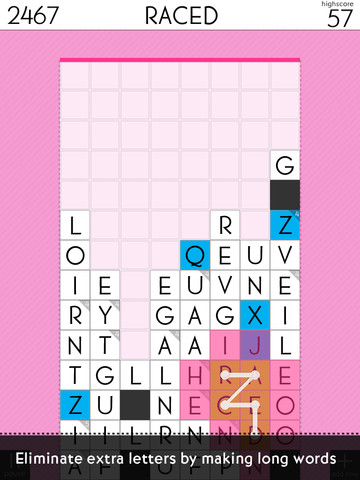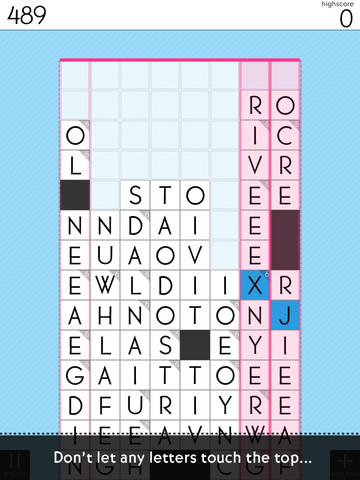![]() It’s a good time to be a word game fan. Every few weeks a new genre standout arrives, ready to tide you over until the next big hit. Now App Store superstar Zach Gage (Unify [$1.99/Free], Bit Pilot [99¢], Halcyon [$1.99]) has thrown his hat into the word game ring with SpellTower [$1.99] . Those of us who fit in the Venn diagram intersection of iPad owners and word game fans benefit — SpellTower is elegant, clever and fun.
It’s a good time to be a word game fan. Every few weeks a new genre standout arrives, ready to tide you over until the next big hit. Now App Store superstar Zach Gage (Unify [$1.99/Free], Bit Pilot [99¢], Halcyon [$1.99]) has thrown his hat into the word game ring with SpellTower [$1.99] . Those of us who fit in the Venn diagram intersection of iPad owners and word game fans benefit — SpellTower is elegant, clever and fun.
Not that it’s entirely unique. We’ve all played any number of games that make use of SpellTower’s main mechanic. Presented with a grid of letters, you spot a word and trace a path through its letters to select it. You can trace in any direction, loop diagonally back on your path, and make words of any length past two. And if that were all there was to it, this would be a yawn and a skip. But it’s not.
 SpellTower isn’t bogged down with complicated rules or conditional abilities. The tutorial is only a handful of screens expressing a handful of simple rules. You can make a word as long as it’s in the game’s dictionary and it’s at least three letters long. Words that are five letters or longer clear letters all around them. You can’t make the same word twice, and if a letter has a number on it, it needs to be used in a word of at least that length. Finally, uncommon letters like Z, J, Q and X clear their rows if they’re used in a word.
SpellTower isn’t bogged down with complicated rules or conditional abilities. The tutorial is only a handful of screens expressing a handful of simple rules. You can make a word as long as it’s in the game’s dictionary and it’s at least three letters long. Words that are five letters or longer clear letters all around them. You can’t make the same word twice, and if a letter has a number on it, it needs to be used in a word of at least that length. Finally, uncommon letters like Z, J, Q and X clear their rows if they’re used in a word.
Those rules will carry you through SpellTower’s four game modes, which change up how the board is presented. Tower mode gives you 150 letters to earn the best score you can. Puzzle mode adds a row to the board each time you make a word, and if any column hits the top your game will end. Extreme Puzzle mode follows the same rules, but requires longer words faster and more often. Rush mode adds new rows over time, putting you on the clock.
 It sounds as though only Rush mode puts any pressure on you, but this is one of the tensest word games I’ve played. Tower mode can be played casually, certainly. You can just accept that you’ll find a number of words, and then you’ll hit the “done" button and wipe your hands of it. But can you just leave towers of letters standing there, unused? It’s beyond me, so each move I make is a balancing act between finding good, high-scoring words, and ensuring I don’t leave too many orphaned letters behind. At least you don’t need to worry about making mistakes — there’s no penalty for words that don’t work.
It sounds as though only Rush mode puts any pressure on you, but this is one of the tensest word games I’ve played. Tower mode can be played casually, certainly. You can just accept that you’ll find a number of words, and then you’ll hit the “done" button and wipe your hands of it. But can you just leave towers of letters standing there, unused? It’s beyond me, so each move I make is a balancing act between finding good, high-scoring words, and ensuring I don’t leave too many orphaned letters behind. At least you don’t need to worry about making mistakes — there’s no penalty for words that don’t work.
In Puzzle and Extreme Puzzle, though, this tension is ratcheted up to the nth degree. Since every move you make adds a new row to the board, you have to consider your moves very, very carefully. Almost inevitably you’ll be stuck with one or more towers of single, orphaned letters, and as those add up it gets harder and harder to make a move that won’t end your game prematurely. These modes aren’t to be played quickly.
Rush mode, on the other hand, must be played at top speed. Except, of course, you still need to weigh the potential of your moves to leave those orphaned towers. But this is a cathartic mode after playing Puzzle for too long. It’s tense, yes, but not every move has the potential to be fatal.
These four modes offer a variety of satisfying play styles, and it sounds like Zach Gage has plans for more to come. Also coming are Game Center achievements. Leaderboards are already in, but there’s a need for achievements to mark things like fully clearing the board in Tower mode. If I ever pull it off, I’m going to want to be able to smugly show off my word superiority. A few other little touches could help the game, like a more obvious way to end Tower mode and a score breakdown.
But SpellTower is already a complete package, brought together by Gage’s trademark use of cheerful colors, simple patterns and elegant typography. It’s a shame that it’s only for iPad owners for now, but if you can pick it up, you should. And if you have ideas for other modes you’d like to see, you can share them with the developer in our discussion thread. Assuming you can find the words, that is.
